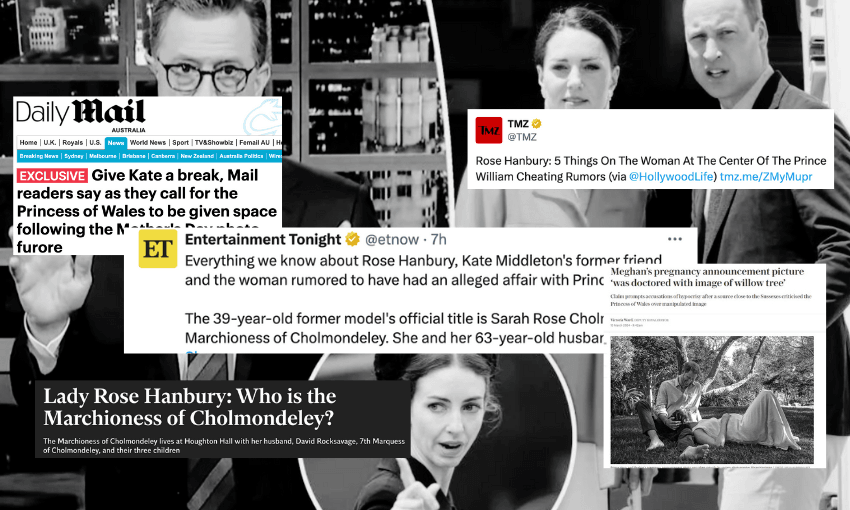Media coverage of the Late Show host’s monologue about the woman rumoured to be the Prince of Wales’s mistress is radically different, depending on where you look.
The online frenzy around Kate Middleton’s disappearance from the public eye reached boiling point two weeks ago. Surgeons, bum lifters and abdomen specialists alike now have murder detective boards on the go, joining the rest of us diseased-of-mind folk in pinning information together on what kind of surgery requires such a long recovery period.
The release of a digitally altered photo of the Princess of Wales and her three children on Sunday upped the heat, resulting in further proliferation of the term “online super sleuths” to distinguish celebrity gossip on the internet from constitutionally relevant reporting… on the internet. The subsequent kill notice issued by international news agencies rocketed us into atmospheric temperatures humans simply shouldn’t be able to sustain. By the time the online super sleuths did the forensics on the photo, we were hurtling towards the sun. A monologue by our very own super stan, Stephen Colbert, on US late night television on Wednesday now has everyone at the point of implosion.
Colbert riffs on the latest round of online speculation that connects Kate’s absence to resurfaced rumours about an affair between Rose Hanbury and Prince William. “So, I think we all know who the alleged other woman is. Say it with me – the Marchioness of Cholmondeley – what a beautiful name!” The Americans have long poked fun at their weird transatlantic cousins, regarding the monarchy as an oddity – something to do when confronted with their own oddities, I guess.
Here, Colbert’s monologue was detailed comprehensively by the Herald. On Stuff, reporting looked to be adhering to some ancient, deferential protocol. I initially couldn’t work out why it had no mention of Hanbury nor the rumoured affair and instead used a very British pearl clutch about “scurrilous rumours”. A quick scroll to the bottom of the story reveals it is a republished article from The Telegraph in the UK. Common practice, no further notes are required, except in signposting the obvious difference between the way media in the UK are reporting on Colbert and the inferno of speculation, and the way media around the world are covering it.
Looking at media coverage of the Colbert bit in the UK, Hanbury’s name in connection with a royal affair is nowhere to be found. The Guardian says the word affair, but that’s it.
The Independent blinked innocently after publishing a “Who is Rose Hanbury?” piece the other day. The Daily Mail has gone full Rule Britannia, running an exclusive about its mailbag being full of letters from people asking for Kate to be left alone. Over at The Telegraph, an age-old game of gotcha is underway, calling out the woman of colour the other prince married for also doctoring images. In the US, TMZ, Entertainment Tonight, and countless others are tweeting names and rumours with impunity.
There have long been whispers that media in the UK are not allowed to report on the affair, rumoured or otherwise, or name names. There is speculation about a gag so encompassing it can not be named. I know this not because I belong to a special club, but because it is being openly discussed on X and Reddit.
Once again, the British royal family has proven its super power is uniting the Western world in warming its hands around a single monocultural flame. Such discursive power was last seen when Queen Elizabeth died.
In the immediate aftermath of her death, traditional media treated it all very reverently, in accordance with decades-old protocol. In stark contrast, as I wrote at the time, “social media on the other hand … crunched the Queen between a billion sharp teeth, only to open its mouth and regurgitate microscopic distortions of her image into the faces of anyone willing to watch, rendering her death meaningless in approximately two hours.”
The seemingly never ending Middleton saga has also proven that the royal family’s biggest weakness is knowing what to do when a warm flame becomes a fire, raging well outside its control. Queen Elizabeth must be five minutes away from descending from the literal cloud in which she now lives. The chasmic divide between social media and media, observable after her death, has now taken on the appearance of the last man on earth holding back a tsunami.
Glowing clouds in the shape of the Queen’s profile form in the sky just hours after she passed away https://t.co/GvQb6xv2mz
— Mail+ (@DailyMailUK) September 9, 2022
In this age of borderless media consumption, it is an example of the patently ridiculous. It bears some resemblance to the more consequential issue of name suppression. Rigidly adhered to by media, it’s often left hanging by a thread in today’s unregulated information environment. The name suppression order for Grace Millaine’s killer, Jesse Kempson, was broken by Google in an email to subscribers in July 2019 and again by Leo Molloy in an online forum in November that same year.
Rumours of gag orders aside, media in the UK are now left looking impotent, able to do nothing to quell the idea that they exist in symbiosis with the royal family while the rest of us read whatever we like without geographic restriction. The royal family looks to be trying to manipulate a web fast unravelling or completely floundering, as they once again learn that for many, they hold no greater position than any other celebrity dynasty, a golden goose laying endless and precious eggs, free for all to take, no matter where you live.


